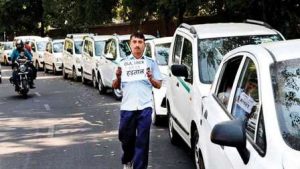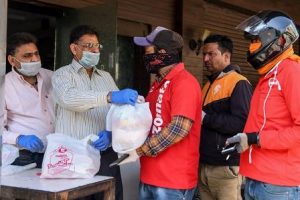Pandemic-Hit Gig Workers and Their Struggles
The Labour Department, Transport Department and companies are divided and a new logic emerged that app-based companies are the aggregators and drivers will be treated under gig economy workers and platform workers. Hence, a new policy is required to protect the rights and interests of gig economy workers.
The gig economy is characterised by two aspects – use and throw labour force and invisible employer. These two aspects are working against everything that workers have fought for centuries,  which are the basic rights of workers, fair wages and decent standard of living. During the industrialisation era, workers had the opportunity to fight and negotiate for their rights against the entity that had a physical infrastructure and the managerial personnel. However, in the gig economy they are fighting with an employer who is nebulous at best and invisible in most of the cases.
which are the basic rights of workers, fair wages and decent standard of living. During the industrialisation era, workers had the opportunity to fight and negotiate for their rights against the entity that had a physical infrastructure and the managerial personnel. However, in the gig economy they are fighting with an employer who is nebulous at best and invisible in most of the cases.
Post lockdown in the economy with such a working structure, the Ola and Uber drivers and the people who delivered us things only at one click on smart phones are fighting two battles both at the same time. One is of health as they are the people at the frontline delivering essentials and transporting people and another is against the gig economy.
“Due to the pandemic, people are scared and hence the bookings are very low. On top of that the companies have asked their drivers to sanitise the car after every ride. With very low income and around 30 per cent commission to pay, bearing the sanitation cost during the entire day was an added burden”, shared Abhishek. He was speaking at the webinar organised by Praxis along with Indian Federation of App-based Transport Workers (IFAT) to bring forward the voices of gig workers from the margins. Abhishek has been working in the cab industry for almost a decade and is the spokesperson of Savodaya Driver’s Association of Delhi. He shared about the plight of drivers and posed serious questions regarding the role of cab aggregators in ensuring their safety.
“We are more prone to be infected with virus as we do public dealing on a daily basis. In car, the distance between the customer and the driver is less than one meter. None of the provisions talk about welfare of drivers. Neither any of the guidelines have been issued by company nor should the government regarding what protocols to be followed by them during the travel,” said Abhishek.
Similarly, Ragini Gaur, a first-year BSc student and a driver with Ola and Uber raised pertinent questions regarding the efforts of cab aggregator companies and of the government in favour of drivers. She shared that the government declared to distribute Rs 5000 to all the drivers, but in reality, only 5 per cent of the total drivers who had the badges received the amount.
Also Read : New Labour Codes: Derailing the Hard-earned Workers’ Rights
In the same way the companies too collected funds in the name of supporting drivers, but none of the benefits reached the drivers. Suganthi another driver facing crucial financial crunch voiced a similar concern.
“Unfortunately, even after weeks of re-operational services after the lockdown, companies like Ola did not provide the drivers any safety kits, but charged the commission regularly”, shared Sripal Reddy, the Organising Secretary of the Telangana Four Wheelers’ Union and a cab driver with Ola.The other challenge that he highlighted was that of paying the installment fee of Rs1075 regularly irrespective of low or no income. “Although the RBI had announced that customers can pay EMIs after three months, none of the banks or the company had agreed to this statement. We have been asked to pay our installments and if we fail to pay it then the penalties were changed in double”, he shared. Adding on Kamaljeet Singh Gill, Vice President of IFAT and President of Savodaya Driver’s Association of Delhi, underlined their responsible behaviour of the aggregator companies towards cabdrivers. “Whosoever received relief fund from Ola were briefed that ‘this is refundable’, which means later it will be taken back from them. The government ordered companies to pay salaries to all, but they have not done anything”, he said.
 Talking about the challenges of the app-based transport workers, Dharmendra Vaishnav, President of the Indian Delivery Lions Organisation, Jaipur and Joint Secretary of IFAT, shared about the safety issues, mismatched income and expenses and conditions of workers before COVID-19 and now. “After stepping out from home whether it is a cab driver or a delivery person, s/he doesn’t know with what income they will come back home. They often work for 12 to 16 hours to earn an income. Sometimes orders get snatched at the gunpoint, accidents occur and the workers are also beaten up badly. In any of the circumstance they are not provided with any insurance, or medical healthcare claim relief.” Apart from that the workers also have to bear insensitive behaviour of the company as it threatens to cancel their IDs and force them to come to work even at sensitive instances of death of family members. “Thought heir advertisements talk about how all the safety measures are being taken and the customer’s food is in safe hands, but in reality, they provide nothing to the workers in the name of safety measures”, he revealed. Ironically companies like Swiggy, Zomato and Dunzo managed to collect corers of fund for COVID-19, but they had not given any benefit to their workers.
Talking about the challenges of the app-based transport workers, Dharmendra Vaishnav, President of the Indian Delivery Lions Organisation, Jaipur and Joint Secretary of IFAT, shared about the safety issues, mismatched income and expenses and conditions of workers before COVID-19 and now. “After stepping out from home whether it is a cab driver or a delivery person, s/he doesn’t know with what income they will come back home. They often work for 12 to 16 hours to earn an income. Sometimes orders get snatched at the gunpoint, accidents occur and the workers are also beaten up badly. In any of the circumstance they are not provided with any insurance, or medical healthcare claim relief.” Apart from that the workers also have to bear insensitive behaviour of the company as it threatens to cancel their IDs and force them to come to work even at sensitive instances of death of family members. “Thought heir advertisements talk about how all the safety measures are being taken and the customer’s food is in safe hands, but in reality, they provide nothing to the workers in the name of safety measures”, he revealed. Ironically companies like Swiggy, Zomato and Dunzo managed to collect corers of fund for COVID-19, but they had not given any benefit to their workers.
The false publicity stunt of the app-based companies was further revealed by Mohammed Inayath Ali, Joint Secretary of IFAT and Secretary of NCTU Karnataka union.
Also Read : COVID-19 Pandemic: Socio-Economic Impact in India
“The buzz on social media by these companies to support the drivers was just to present themselves sensitive to the people. There is a twitter account of Indian Drivers Federal Association through which you will get to know the actual situation of drivers they underwent and still undergoing during this pandemic”, he shared. Actually, the support from the accumulated funds reached to only 15 to 20 per cent of the drivers. Apart from this an announcement was made on social media accounts of Uber that it will give Rs 5000 to the drivers; however, this benefit was introduced with certain conditions. The driver who worked for longer hours or who had a greater number of hours in their login system and had the highest ratings was provided with the money. Also, no support of promised 500 cars was provided in emergency services for commuting purpose specifically for health staffs. Furthermore, in Karnataka none of the drivers were tested, even though some complained of symptoms while working during the emergency.
Shaik Salauddin, National General Secretary of IFAT and State President of Telangana Four Wheeler Driver’s Association, shared that due to a missing framework that defined workers of gig economy, the companies were freed from many obligations. The companies like Ola and Uber show drivers as their partners which caused a communication gap between the Labour Department, Transport Department and IT companies. “These three departments were divided and a new logic emerged that they are the aggregators and drivers will be treated under gig economy workers and platform workers. Hence, a new policy is required. About 30,000 million workers are in urban settings, who are working under contract and under this new definition and the graph is close to 69 million”, added Salauddin.
